2012高一英语精品学案Module3整单元(外研版必修3)(有答案)
- 格式:docx
- 大小:25.84 KB
- 文档页数:8
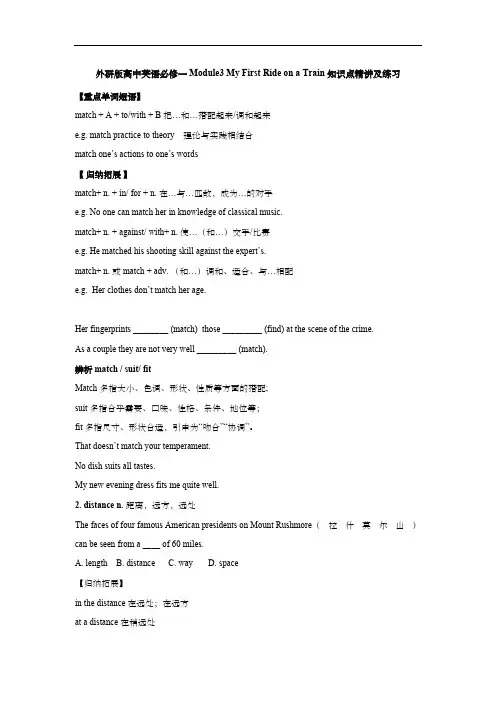
外研版高中英语必修一Module3 My First Ride on a Train知识点精讲及练习【重点单词短语】match + A + to/with + B 把…和…搭配起来/调和起来e.g. match practice to theory 理论与实践相结合match one’s actions to one’s words【归纳拓展】match+ n. + in/ for + n. 在…与…匹敌,成为…的对手e.g. No one can match her in knowledge of classical music.match+ n. + against/ with+ n. 使…(和…)交手/比赛e.g. He matched his shooting skill against the expert’s.match+ n. 或 match + adv. (和…)调和、适合、与…相配e.g. Her clothes don’t match her age.Her fingerprints ________ (match) those _________ (find) at the scene of the crime.As a couple they are not very well _________ (match).辨析 match / suit/ fitMatch多指大小、色调、形状、性质等方面的搭配;suit多指合乎需要、口味、性格、条件、地位等;fit 多指尺寸、形状合适,引申为“吻合”“协调”。
That doesn’t match your temperament.No dish suits all tastes.My new evening dress fits me quite well.2. distance n.距离,远方,远处The faces of four famous American presidents on Mount Rushmore(拉什莫尔山)can be seen from a ____ of 60 miles.A. lengthB. distanceC. wayD. space【归纳拓展】in the distance 在远处;在远方at a distance 在稍远处keep one’s distance from 与…保持一定距离keep sb. at a distance 与…保持距离;不予某人接近distant adj. 远的;疏远的;稀疏的;冷淡的be distant towards sb. 对...冷淡be distant from 离… 远3.means n.方式,手段(单复数同形)e.g.There is no doubt that radio and television are important means of communication.There is no means of finding out what happened.【归纳拓展】1. by means of sth. 用…的办法e.g. The government helped the victims of the earthquake by every means.He climbed up the tree by means of a ladder.2.by no means 绝不,一点也不(置于句首时须倒装)e.g.By no means is this fight the end of out friendship.【及时训练】1.Every possible means ______ been tried, and we find only ______ this means can we do it we.A. have; inB. have; byC. has; inD. has; by2.For him ______ stage is just ______ means of making a living.A. a aB. the aC. the; theD. a; the4. refer to 提到,涉及;说起;参考,查阅;指的是 (referred, referred, referring)e.g We agreed never to refer to the matter again.我们一致同意再也不提这件事。
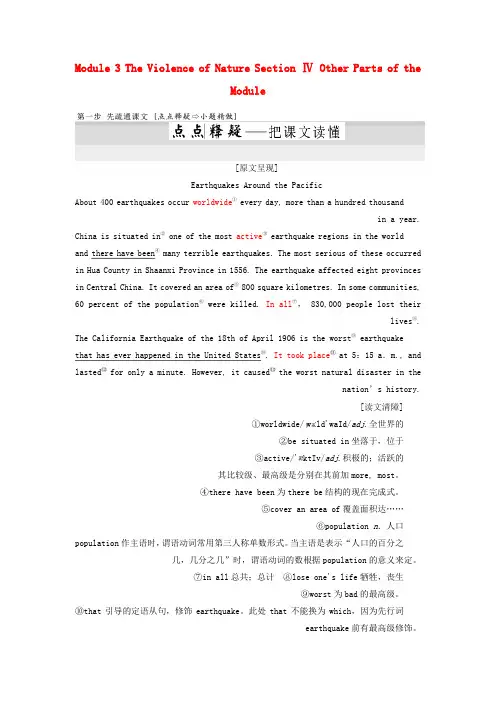
Module 3 The Violence of Nature Section Ⅳ Other Parts of theModule[原文呈现]Earthquakes Around the PacificAbout 400 earthquakes occur worldwide ①every day, more than a hundred thousandin a year.China is situated in ②one of the most active ③earthquake regions in the world many terrible earthquakes. The most serious of these occurred ④there have been and in Hua County in Shaanxi Province in 1556. The earthquake affected eight provinces in Central China. It covered an area of ⑤800 square kilometres. In some communities, 60 percent of the population ⑥were killed. In all ⑦, 830,000 people lost theirlives ⑧.The California Earthquake of the 18th of April 1906 is the worst ⑨earthquake and m., .15 a :at 5 ⑪It took place . ⑩that has ever happened in the United States lasted ⑫for only a minute. However, it caused ⑬ the worst natural disaster in thenation ’s history.[读文清障]①worldwide/ˌw ɜːld'waId/adj .全世界的②be situated in 坐落于,位于③active/'æktIv/adj .积极的;活跃的其比较级、最高级是分别在其前加more, most 。
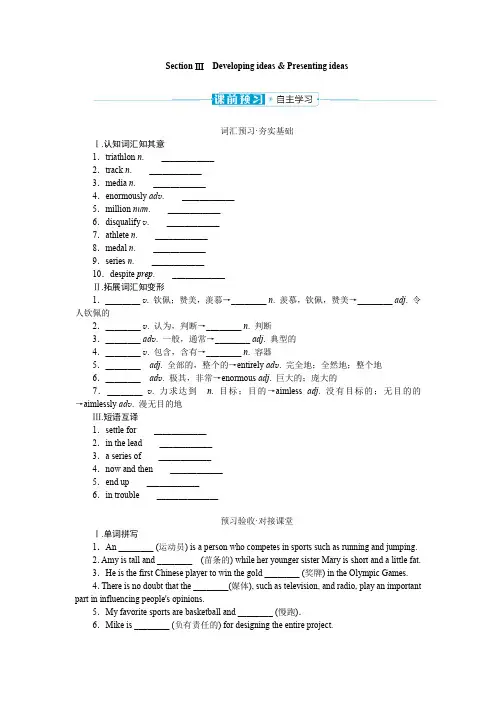
Section ⅢDeveloping ideas & Presenting ideas词汇预习·夯实基础Ⅰ.认知词汇知其意1.triathlon n. ____________2.track n. ____________3.media n. ____________4.enormously ad v. ____________5.million num. ____________6.disqualify v. ____________7.athlete n. ____________8.medal n. ____________9.series n. ____________10.despite prep. ____________Ⅱ.拓展词汇知变形1.________ v. 钦佩;赞美,羡慕→________ n. 羡慕,钦佩,赞美→________ adj. 令人钦佩的2.________ v. 认为,判断→________ n. 判断3.________ ad v. 一般,通常→________ adj. 典型的4.________ v. 包含,含有→________ n. 容器5.________ adj. 全部的,整个的→entirely ad v. 完全地;全然地;整个地6.________ ad v. 极其,非常→enormous adj. 巨大的;庞大的7.________ v. 力求达到n. 目标;目的→aimless adj. 没有目标的;无目的的→aimlessly ad v. 漫无目的地Ⅲ.短语互译1.settle for ____________2.in the lead ____________3.a series of ____________4.now and then ____________5.end up ____________6.in trouble ______________预习验收·对接课堂Ⅰ.单词拼写1.An ________ (运动员) is a person who competes in sports such as running and jumping.2.Amy is tall and ________ (苗条的) while her younger sister Mary is short and a little fat.3.He is the first Chinese player to win the gold ________ (奖牌) in the Olympic Games.4.There is no doubt that the ________(媒体), such as television, and radio, play an important part in influencing people's opinions.5.My favorite sports are basketball and ________ (慢跑).6.Mike is ________ (负有责任的) for designing the entire project.7.The museum is open daily ________ (在整个期间) the year.8.The only difference between us is the colour of our ________ (皮肤).9.Doctor Bethune spent his ________ (全部的) life in China as a doctor.Ⅱ.选词填空now and then, no longer, be related to, to one's surprise, have...in mind, in the lead,leave... behind, in trouble1.He set off for London, ________ the children ________ with their mother.2.When ________,the young man can always work out a solution.3.If I can only stay ahead of the other runners, now that I am ________,I can win this race!4.Even though Joe and I work in the same building, we only see each other ________.5.________,I found my little nephew dressed in a girl's skirt.6.Watching TV all evening wasn't exactly what I ________.7.She could ________ find a way to get into the valley.8.It is reported that much of the crime in this area ________ drug abuse.阅读研析·合作学习Ⅰ.框架建构:整体理解⇓the final part of the 2016 World Triathlon Series in 1.________⇓Alistair Brownlee and his younger brother, JonnyAlistair Brownlee was in 2.________ place and Jonny in the lead. Jonny 3.________ onto the track. Alistair helped his brotherⅡ.根据课文内容选择正确答案(细节探究)1.What can we know from the first paragraph?A.Alistair Brownlee had to be pushed by others in the race.B.Jonny was faster than his brother before falling down.C.It was extremely hot the day the triathlon was held.D.Alistair found it hard to choose whether to help his brother or not.2.Which of the following is true according to the text?A.Alistair was the first to cross the finish line.B.Jonny pushed Alistair over the finish line.C.Alistair helped Jonny become the secondD.Alistair was proud of his own move.3.Why does Alistair think that having a brother is “an advantage”?A.Because he can't leave his brother when they train.B.Because he likes arguing with his brother over stupid things.C.Because his brother sets him a good example to learn from.D.Because his brother can bring him positive force in everything.4.From Alistair's explanation for his decision, we know that ________.A.Alistair is afraid of his motherB.Alistair really treated himself as a brotherC.Alistair's mother loves his bother more than himD.Alistair didn't like others' opinions on his actions5.The text mainly tells us ________.A.people's different opinions about the Brownlee brothersB.love and competition are equally important in the matchC.the value of brotherly loveD.love is preciousⅢ.课文词块翻译1.in his thirties ____________2.be related to families ____________3.a wide range of events ____________4.at that moment ____________5.the United Nations ____________Ⅳ.重点句式补全1.奇怪的是,尽管头发正在变白,他的胡子仍然是红色的!Strangely, his beard is still red ____________!2.但是现在我通常把头发扎成马尾辫,因为它已经长了很多。
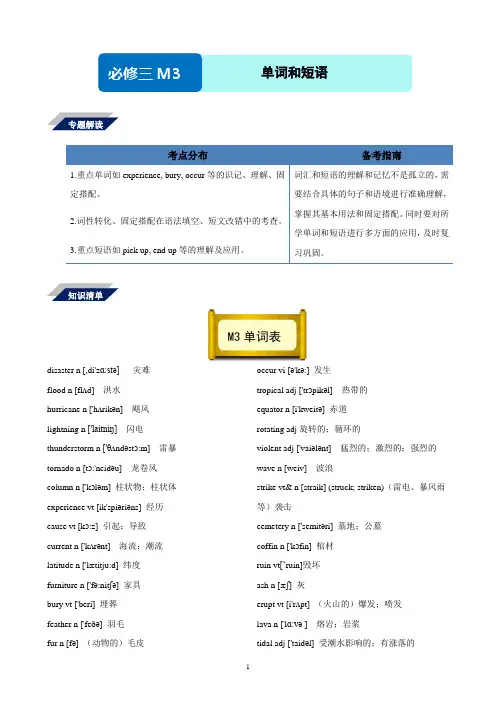
考点分布备考指南1.重点单词如experience, bury, occur等的识记、理解、固定搭配。
词汇和短语的理解和记忆不是孤立的,需要结合具体的句子和语境进行准确理解,掌握其基本用法和固定搭配。
同时要对所学单词和短语进行多方面的应用,及时复习巩固。
2.词性转化、固定搭配在语法填空、短文改错中的考查。
3.重点短语如pick up, end up等的理解及应用。
disaster n [,di'zɑ:stə] 灾难flood n [flʌd] 洪水hurricane n ['hʌrikən] 飓风lightning n ['laitniŋ] 闪电thunderstorm n ['θʌndəstɔ:m] 雷暴tornado n [tɔ:'neidəu] 龙卷风column n ['kɔləm] 柱状物;柱状体experience vt [ik'spiəriəns] 经历cause vt [kɔ:z] 引起;导致current n ['kʌrənt] 海流;潮流latitude n ['lætitju:d] 纬度furniture n ['fə:nitʃə] 家具bury vt ['beri] 埋葬feather n ['feðə] 羽毛fur n [fə] (动物的)毛皮occur vi [ə'kə:] 发生tropical adj ['trɔpikəl] 热带的equator n [i'kweitə] 赤道rotating adj旋转的;循环的violent adj ['vaiələnt] 猛烈的;激烈的;强烈的wave n [weiv] 波浪strike vt& n [straik] (struck; striken)(雷电、暴风雨等)袭击cemetery n ['semitəri] 墓地;公墓coffin n ['kɔfin] 棺材ruin vt[‘ruin]毁坏ash n [æʃ] 灰erupt vt [i'rʌpt] (火山的)爆发;喷发lava n ['lɑ:və ] 熔岩;岩浆tidal adj ['taidəl] 受潮水影响的;有涨落的专题解读知识清单单词和短语必修三M3M3单词表volcano n [vɔl'keinəu] 火山previous adj ['pri:vjəs] 以前的eruption n [i'rʌpʃən](火山的)爆发;喷发possibility n [,pɔsə'biləti] 可能;可能性earthquake n ['ə:θkweik] 地震terrifying adj ['tərifaiiŋ]吓人的;可怕的luckily adv ['lʌkili] 幸运地;幸亏thankfully adv ['θæŋkfulli] 感激地;满怀感谢地hopefully adv ['həupfuli] 满怀希望地;有希望地sadly adv ['sædli] 伤心地;不幸地fortunately adv ['fɔitʃənitli] 幸运地;幸亏warning n ['wɔ:niŋ] 警告worldwide adj ['wə:ld,waid] 全世界的active adj ['æktiv] 积极的;活跃的damage n& v ['dæmidʒ] 损失;损害M3短语pick up 卷起;掀起take off 去掉on average 平均起来end up 以……结束set fire to 放火(焚烧)……catch fire 着火put out 扑灭(火)take place 发生in all 总共;总计项目单词及其词性变化(语法填空必备)重点单词1.disaster n. 灾难2.cause vt. 引起;造成3.bury vt. 埋葬4.occur vi. 发生5.strike vt.& n. (雷电、暴风雨等)袭击6.ruin vt. 毁坏7.active adj. 积极的;活跃的8.damage n.& v. 损失;损害9.experience vt.经历→experienced adj.有经验的10.furniture n.家具→furnish vt.装备;配备11.violent adj.猛烈的;激烈的;强烈的→ violence n.暴力12.possibility n.可能;可能性→possible adj.可能的→impossible adj.不可能的13.terrifying adj.吓人的;可怕的→terrified adj.感到害怕的→terrify vt.使害怕14.luckily adv.幸运地;幸亏→lucky adj.幸运的→luck n.运气15.thankfully adv.感激地;满怀感谢地→thankful adj.感激的16.warning n.警告→warn v.警告重点短语1.pick_up卷起;掀起;拾起;接(某人);偶然学会;情况转好2.take_off 去掉;脱掉;起飞3.on_average 平均起来4.end_up 结果为……;以……结束5.set_fire_to 放火(焚烧)……6.catch_fire 着火7.put_out 扑灭(火);生产;制造8.take_place 发生,进行9.plenty_of 许多;大量10.in_all 总共;总计单元知识预览重点单词短语精讲1.experience vt.经历;体验n.经历;经验[教材原句]Do you know anyone who has experienced one of the events?你认识曾经经历过其中一种事件的人吗?experience in/of在……方面的经验by/from experience 通过经验,从经验中experienced adj. 有经验的;熟练的be experienced in 在……方面有经验[例句研读]①From/In my experience, there are three main reasons why people don't cook more often: ability, money, and time.根据我的经验看,人们不经常做饭主要有三个原因:能力、金钱和时间。
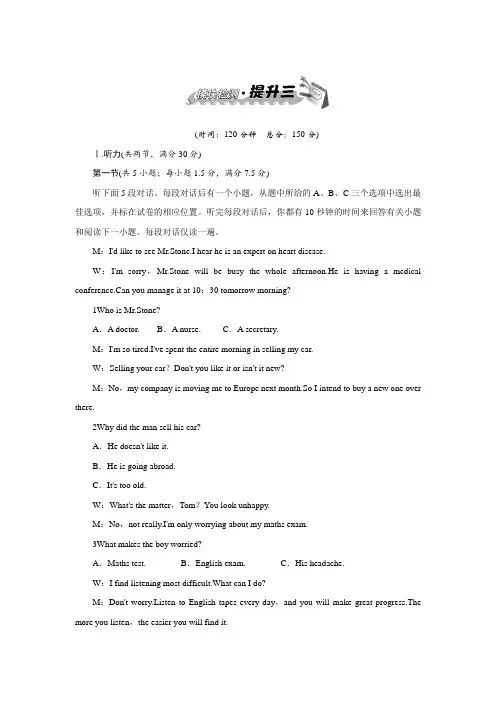
(时间:120分钟总分:150分)Ⅰ.听力(共两节,满分30分)第一节(共5小题;每小题1.5分,满分7.5分)听下面5段对话。
每段对话后有一个小题,从题中所给的A、B、C三个选项中选出最佳选项,并标在试卷的相应位置。
听完每段对话后,你都有10秒钟的时间来回答有关小题和阅读下一小题。
每段对话仅读一遍。
M:I'd like to see Mr.Stone.I hear he is an expert on heart disease.W:I'm sorry,Mr.Stone will be busy the whole afternoon.He is having a medical conference.Can you manage it at 10:30 tomorrow morning?1Who is Mr.Stone?A.A doctor.B.A nurse. C.A secretary.M:I'm so tired.I've spent the entire morning in selling my car.W:Selling your car?Don't you like it or isn't it new?M:No,my company is moving me to Europe next month.So I intend to buy a new one over there.2Why did the man sell his car?A.He doesn't like it.B.He is going abroad.C.It's too old.W:What's the matter,Tom?You look unhappy.M:No,not really.I'm only worrying about my maths exam.3What makes the boy worried?A.Maths test. B.English exam. C.His headache.W:I find listening most difficult.What can I do?M:Don't worry.Listen to English tapes every day,and you will make great progress.The more you listen,the easier you will find it.4What does the man advise the girl to do?A.To listen more. B.To speak more. C.To write more.W:Excuse me.Have you been waiting long?M:About ten minutes.W:Did you notice whether the Number Seven bus had gone by?M:Not while I've been standing here.I'm waiting for the Number Seven myself.5What are they doing?A.Waiting for a friend.B.Waiting for a bus.C.Visiting a zoo.第二节(共15小题;每小题1.5分,满分22.5分)听下面5段对话或独白。
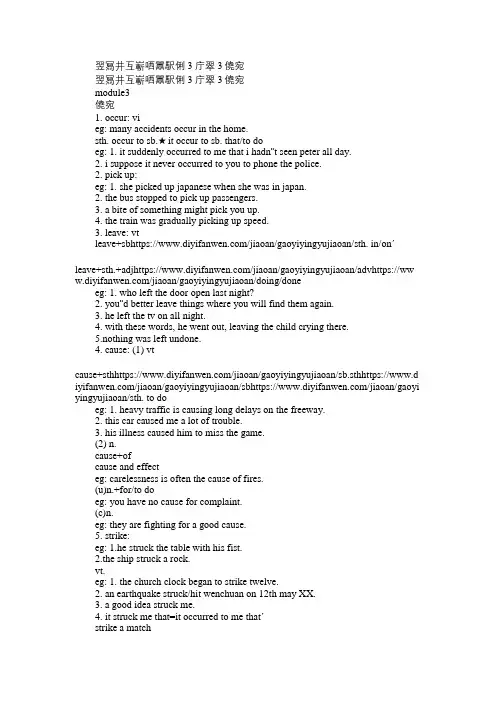
翌冩井互嶄哂囂駅俐3 庁翠3僥宛翌冩井互嶄哂囂駅俐3 庁翠3僥宛module3僥宛1. occur: vieg: many accidents occur in the home.sth. occur to sb.★it occur to sb. that/to doeg: 1. it suddenly occurred to me that i hadn¨t seen peter all day.2. i suppose it never occurred to you to phone the police.2. pick up:eg: 1. she picked up japanese when she was in japan.2. the bus stopped to pick up passengers.3. a bite of something might pick you up.4. the train was gradually picking up speed.3. leave: vtleave+sbhttps:///jiaoan/gaoyiyingyujiaoan/sth. in/on´leave+sth.+adjhttps:///jiaoan/gaoyiyingyujiaoan/advhttps://ww /jiaoan/gaoyiyingyujiaoan/doing/doneeg: 1. who left the door open last night?2. you¨d better leave things where you will find them again.3. he left the tv on all night.4. with these words, he went out, leaving the child crying there.5.nothing was left undone.4. cause: (1) vtcause+sthhttps:///jiaoan/gaoyiyingyujiaoan/sb.sthhttps://www.d /jiaoan/gaoyiyingyujiaoan/sbhttps:///jiaoan/gaoyi yingyujiaoan/sth. to doeg: 1. heavy traffic is causing long delays on the freeway.2. this car caused me a lot of trouble.3. his illness caused him to miss the game.(2) n.cause+ofcause and effecteg: carelessness is often the cause of fires.(u)n.+for/to doeg: you have no cause for complaint.(c)n.eg: they are fighting for a good cause.5. strike:eg: 1.he struck the table with his fist.2.the ship struck a rock.vt.eg: 1. the church clock began to strike twelve.2. an earthquake struck/hit wenchuan on 12th may XX.3. a good idea struck me.4. it struck me that=it occurred to me that´strike a matchstrike homestrike a bargainstrike while the iron is hot(c)n.go on strike /be on strikecall a strikehunger strike6. end: vi.eg: the film ended with the heroine dying.。
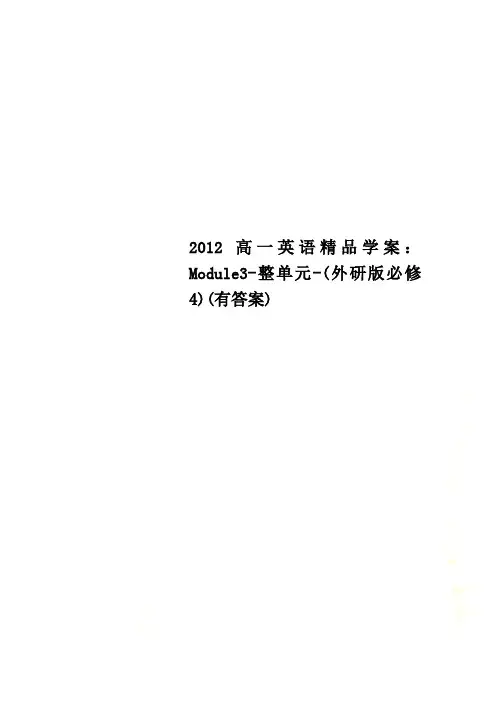
2012高一英语精品学案:Module3-整单元-(外研版必修4)(有答案)Book ⅣModule 3 Body Language and Non—verbal CommunicationPeriod Ⅰ Introduction & Reading ComprehensionⅠ. Do the exercises in Activities 1—3 on P21Ⅱ. Fast reading:1. Read the passage and choose the best title in Activity 1 on P.22.2. Read it again and decide T or F in Activity 2 on P23Ⅲ. Careful reading.2. Translate the following sentences into Chinese or English:①We see examples of unconscious body language very often, yet there is also “learned” bodylanguage, which varies from culture to culture.②即使今天,有些人在非正式地问候时,也仍然用手来做一个信任的姿势。
◆at all “”可用于肯定句、否定句和疑问句(1)用于否定句,表示“一点儿也不”或“”(回答Thank you; It’s verykind of you等)(2)用于肯定句和疑问句,起强调作用,译为“”What did you do at all?(3)用于条件句,译为“既然;果真”Work hard if you do want to go to university at all. 【拓展】after all in allabove all first of allall the same all of a sudden3. Can you give reasons for your choice?give a reason for sth. /doing sth.eg. The monitor suddenly left without giving any reason. 【拓展】reason for…for some reasonreasonable adj.adv.合理地;理智地4. When in Rome, do as the Romans do. 入乡随俗。

考点分布备考指南1.重点单词如experience, bury, occur等的识记、理解、固定搭配。
词汇和短语的理解和记忆不是孤立的,需要结合具体的句子和语境进行准确理解,掌握其基本用法和固定搭配。
同时要对所学单词和短语进行多方面的应用,及时复习巩固。
2.词性转化、固定搭配在语法填空、短文改错中的考查。
3.重点短语如pick up, end up等的理解及应用。
disaster n [,di'zɑ:stə] 灾难flood n [flʌd] 洪水hurricane n ['hʌrikən] 飓风lightning n ['laitniŋ] 闪电thunderstorm n ['θʌndəstɔ:m] 雷暴tornado n [tɔ:'neidəu] 龙卷风column n ['kɔləm] 柱状物;柱状体experience vt [ik'spiəriəns] 经历cause vt [kɔ:z] 引起;导致current n ['kʌrənt] 海流;潮流latitude n ['lætitju:d] 纬度furniture n ['fə:nitʃə] 家具bury vt ['beri] 埋葬feather n ['feðə] 羽毛fur n [fə] (动物的)毛皮occur vi [ə'kə:] 发生tropical adj ['trɔpikəl] 热带的equator n [i'kweitə] 赤道rotating adj旋转的;循环的violent adj ['vaiələnt] 猛烈的;激烈的;强烈的wave n [weiv] 波浪strike vt& n [straik] (struck; striken)(雷电、暴风雨等)袭击cemetery n ['semitəri] 墓地;公墓coffin n ['kɔfin] 棺材ruin vt[‘ruin]毁坏ash n [æʃ] 灰erupt vt [i'rʌpt] (火山的)爆发;喷发lava n ['lɑ:və ] 熔岩;岩浆tidal adj ['taidəl] 受潮水影响的;有涨落的专题解读知识清单单词和短语必修三M3M3单词表volcano n [vɔl'keinəu] 火山previous adj ['pri:vjəs] 以前的eruption n [i'rʌpʃən](火山的)爆发;喷发possibility n [,pɔsə'biləti] 可能;可能性earthquake n ['ə:θkweik] 地震terrifying adj ['tərifaiiŋ]吓人的;可怕的luckily adv ['lʌkili] 幸运地;幸亏thankfully adv ['θæŋkfulli] 感激地;满怀感谢地hopefully adv ['həupfuli] 满怀希望地;有希望地sadly adv ['sædli] 伤心地;不幸地fortunately adv ['fɔitʃənitli] 幸运地;幸亏warning n ['wɔ:niŋ] 警告worldwide adj ['wə:ld,waid] 全世界的active adj ['æktiv] 积极的;活跃的damage n& v ['dæmidʒ] 损失;损害M3短语pick up 卷起;掀起take off 去掉on average 平均起来end up 以……结束set fire to 放火(焚烧)……catch fire 着火put out 扑灭(火)take place 发生in all 总共;总计项目单词及其词性变化(语法填空必备)重点单词1.disaster n. 灾难2.cause vt. 引起;造成3.bury vt. 埋葬4.occur vi. 发生5.strike vt.& n. (雷电、暴风雨等)袭击6.ruin vt. 毁坏7.active adj. 积极的;活跃的8.damage n.& v. 损失;损害9.experience vt.经历→experienced adj.有经验的10.furniture n.家具→furnish vt.装备;配备11.violent adj.猛烈的;激烈的;强烈的→ violence n.暴力12.possibility n.可能;可能性→possible adj.可能的→impossible adj.不可能的13.terrifying adj.吓人的;可怕的→terrified adj.感到害怕的→terrify vt.使害怕14.luckily adv.幸运地;幸亏→lucky adj.幸运的→luck n.运气15.thankfully adv.感激地;满怀感谢地→thankful adj.感激的16.warning n.警告→warn v.警告重点短语1.pick_up卷起;掀起;拾起;接(某人);偶然学会;情况转好2.take_off 去掉;脱掉;起飞3.on_average 平均起来4.end_up 结果为……;以……结束5.set_fire_to 放火(焚烧)……6.catch_fire 着火7.put_out 扑灭(火);生产;制造8.take_place 发生,进行9.plenty_of 许多;大量10.in_all 总共;总计单元知识预览重点单词短语精讲1.experience vt.经历;体验n.经历;经验[教材原句]Do you know anyone who has experienced one of the events?你认识曾经经历过其中一种事件的人吗?experience in/of在……方面的经验by/from experience 通过经验,从经验中experienced adj. 有经验的;熟练的be experienced in 在……方面有经验[例句研读]①From/In my experience, there are three main reasons why people don't cook more often: ability, money, and time.根据我的经验看,人们不经常做饭主要有三个原因:能力、金钱和时间。
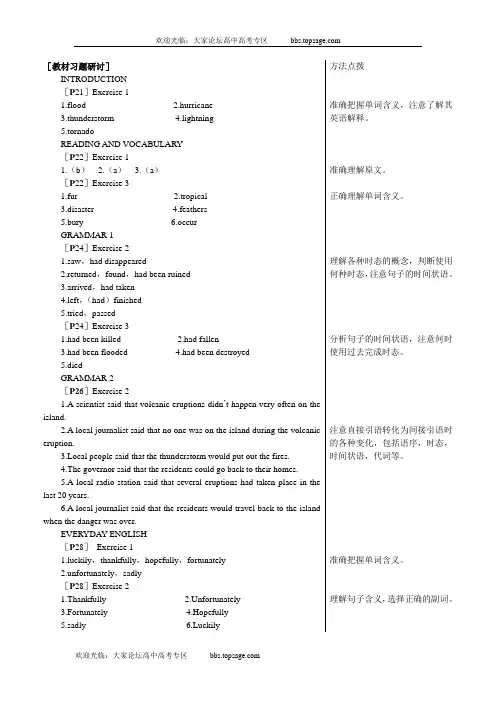
[教材习题研讨]方法点拨INTRODUCTION[P21]Exercise 11.flood2.hurricane3.thunderstorm4.lightning5.tornadoREADING AND VOCABULARY[P22]Exercise 11.(b)2.(a)3.(a)[P22]Exercise 31.fur2.tropical3.disaster4.feathers5.bury6.occurGRAMMAR 1[P24]Exercise 21.saw,had disappeared2.returned,found,had been ruined3.arrived,had taken4.left,(had)finished5.tried,passed[P24]Exercise 31.had been killed2.had fallen3.had been flooded4.had been destroyed5.diedGRAMMAR 2[P26]Exercise 21.A scientist said that volcanic eruptions didn’t happen very often on the island.2.A local journalist said that no one was on the island during the volcanic eruption.3.Local people said that the thunderstorm would put out the fires.4.The governor said that the residents could go back to their homes.5.A local radio station said that several eruptions had taken place in the last 20 years.6.A local journalist said that the residents would travel back to the island when the danger was over.EVERYDAY ENGLISH[P28]Exercise 11.luckily,thankfully,hopefully,fortunately2.unfortunately,sadly[P28]Exercise 21.Thankfully2.Unfortunately3.Fortunately4.Hopefully5.sadly6.Luckily 准确把握单词含义,注意了解其英语解释。
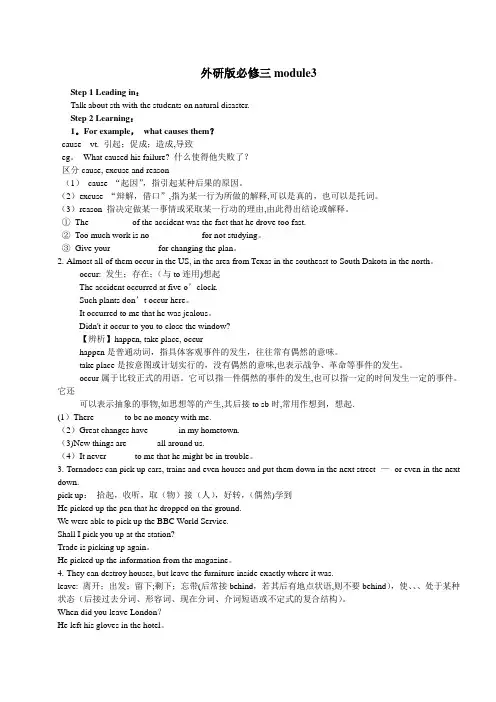
外研版必修三module3Step 1 Leading in:Talk about sth with the students on natural disaster.Step 2 Learning:1。
For example,what causes them?cause vt. 引起;促成;造成,导致eg。
What caused his failure? 什么使得他失败了?区分cause, excuse and reason(1)cause “起因”,指引起某种后果的原因。
(2)excuse “辩解,借口”,指为某一行为所做的解释,可以是真的,也可以是托词。
(3)reason 指决定做某一事情或采取某一行动的理由,由此得出结论或解释。
①The _________ of the accident was the fact that he drove too fast.②Too much work is no ___________ for not studying。
③Give your __________ for changing the plan。
2.Almost all of them occur in the US, in the area from Texas in the southeast to South Dakota in the north。
occur: 发生;存在;(与to连用)想起The accident occurred at five o’clock.Such plants don’t occur here。
It occurred to me that he was jealous。
Didn't it occur to you to close the window?【辨析】happen, take place, occurhappen是普通动词,指具体客观事件的发生,往往常有偶然的意味。
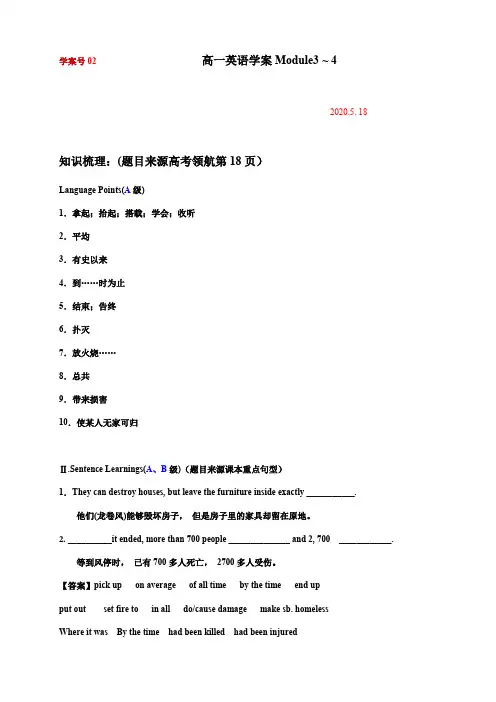
学案号02 高一英语学案Module3 ~ 42020.5. 18知识梳理:(题目来源高考领航第18页)Language Points(A级)1.拿起;拾起;搭载;学会;收听2.平均3.有史以来4.到……时为止5.结束;告终6.扑灭7.放火烧……8.总共9.带来损害10.使某人无家可归Ⅱ.Sentence Learnings(A、B级)(题目来源课本重点句型)1.They can destroy houses, but leave the furniture inside exactly ___________.他们(龙卷风)能够毁坏房子,但是房子里的家具却留在原地。
2.__________it ended, more than 700 people ______________ and 2, 700 ____________.等到风停时,已有700多人死亡,2700多人受伤。
【答案】pick up on average of all time by the time end upput out set fire to in all do/cause damage make sb. homelessWhere it was By the time had been killed had been injured单词点睛(A、B级高考领航27页)experience n. 经验;经历v. 经历;遭受(1)experienced adj. 有经验的;熟练的(2)from/by experience 凭经验;从经验中(得出)be experienced in 在……方面有经验【温馨提示】experience作“经验”讲是不可数名词,作“经历”讲是可数名词。
【活学活用】(1)Mr Brown has _________________ in teaching.布朗先生有丰富的教学经验。
(2)Yesterday afternoon I had __________________.昨天下午,我遭遇了一次可怕的经历。
2012高一英语精品学案:Module1整单元(外研版必修3)(有答案)Module 1 Europe PeriodⅠⅠ. Lead-in: Something about Europe ( location; importance, climate; landform etc)1) Europe is the second smallest continent in the world. It lies to the west of Asia and on the east of the Atlantic Ocean. It is separated by the Mediterranean from Africa and north of Europe is the Arctic Ocean.2) Europe has been playing an important part in the history of the world.a) The Industrial Revolution started from England of Europe.b) The Renaissance started from Italy of Europe. c) Greece is the birth place of western civilization. d) Most of the countries in Europe are developed countries, esp. Western Europe, such as Britain, France, Germany, Italy etc.e) The European Union (including 25 countries) is an economic organization as well as a political one. All the countries in the Eu use the same money. They help each other when facing international affairs. People can live, work, study or travel in the countries without any special permit. 3) The climate is warm and rainy all the year round in most part of Europe.4) The landform here is mainly plains.Ⅱ. Introduction.1. Complete the table with the words in the box (Part 1. P1)2. What do you know about the following cities?a) London: the capital of U.K which is famous for the tower of Londonb) Paris: capital city on the River Seine, the Eiffel Tower, Louvec) Rome: capital city of Italy (Rome was not built in one day/ All roads lead to Romed) Madrid: capital city of Spaine) Athens: capital city of Greece (the birthplace of the Olimpic Games)3. Do part 2 (P.1)Ⅲ. Reading and V ocabulary1. Match the photos with these descriptions. (Part 1. P. 2)2. Read the passage “Great European Cities” and do the following.①The main purpose of the passage is .A. to tell us some European cities and their characters.B. to describe some places of interest in EuropeC. to tell us some events buildings that influenced Europe in history.D. to tell us there are many great cities in Europe②The paragraph of Florence mainly tells us .A. many of Fl orence’s most beautiful paintings were drawn by Leonardo da Vinci.B. There were some greatest painters of all time in FlorenceC. Florence is famous for the renaissanceD. Millions of visitors go to see the Uffizi Palace.③Which of the flowing is true?A. Barcelona is the capital of Spain.B. The church of the Sagrada Facuilia was built in 1926C. The Uffizi Palace is a famous hotel in Florence.D. There were a lot of good writers in ancient Athens.④Which of the following is true auording to the passage?A. Athens was the world’s most powerful city two thousandfive hundred years ago.B. Barcelona is the second largest city of Spain and is situated on the north west coast.C. Paris is one of the most beautiful cities in the world situated on the River Seine.D. More than eight million tourists come to visit Florence every year.⑤Which city is known as the birthplace of western civilization?A. BarcelonaB. ParisC. FlorenceD. Athens⑥What is one of Barcelona’s most famous landmarks?A. The Eiffel TowerB. the Church of the Sagrada Familia.C. The Uffizi PalaceD. The Parthenon on the Acropolis Hill.⑦From the passage we can infer that .A. Paris is larger than BarcelonaB. Athens was the world’s most powerful city two thousand, four hundred years ago becauseof its weaponsC. The Church of Sagrada Familia is famous because it was designed by Antonio GandiD. Visitors like to go to Paris because it is one of the most beautiful cities in the world.⑧Over two thousand years ago, if there had been a war among the cities of Paris, Bareelona,Florence and Athen; which do you think would have won thewar? Athens (most powerful)⑨It is not true thatA. Madrid is about 500 kilometres west of Barcelona.B. The Louvra is situated on the Seine.C. The Renaissance ended in the 1700s.D. It took Gaudi 44 years to work on the Church of the Sagrada Familia.3. Do Exercise 3 and 4 (P. 3)Ⅳ. Homework: Fill in the boxP eriodⅡⅠ. Check the homework:1. France 法国, 法语French2. Spain 西班牙; 西班牙语Spanish3. Greek , 希腊Greece4. Italian 意大利语意大利Italy5. continent 大陆(洲) , continental (adj.)6. Europe 欧洲, European (adj.) Ⅱ.The language points.1. across / through / over ; across / cross横穿马路一定要当心啊. Do be careful when you go across the road. .那匹马跳过栅栏. The horse jumped over the fence.小偷是从窗户爬进来地. The thief came in through the window .2. S. + be / lie + in / on / to / off + 方位词S. + be located / situated in / on / to ……1)台湾在中国东南、福建东部。
3. 4. 5. 6.7. The artistic movement called the Renaissance began inThe Uffizi Palace is a famous hotel in Florence.Florence.A long time ago, Athens was the world ' s most powerful ( )city.Module 1 EuropePeriod 1 Introduction, Function, Reading and VocabularyStudying Goals :1. To arouse Ss ' interest in learning about Europe.2. To get Ss to learn words and phrases to describe location.3. To get Ss to know the famous architectures in the European cities. 4 To get Ss to learn some useful language points. Learning GuidePart 1 Self-study( 自主预习 )Step1 词汇预习 横过, 穿过 大陆的, 大洲的 面向, 面对山脉 5. l _________ 标志性建筑 美术馆 , 画廊 坐落 ( 某处), 位于(某处) 的 位于建筑师 雕刻 , 泥塑 文明 古代的 计划 , 项目 , 工程发源地 在……对面 课前预读Task1. Fast readingRead the passage quickly and answer the question:Which countries do the four cities mentioned in the passage belong toTask2. Intensive reading(1) Read the passage carefully and finish Activity 2 on page 3. (2) Read the passage carefully and finish Activity 4.( ) Barcelona is the capital of Spain.The Church of the Sagrada Familia was built in 1926. Task3 .careful readingRead the text and decide if these sentences are true (T) or false(F)The Eiffel Tower is a tall building in France.lot of 1. 2. There are restaurantsand( )cafesinParis.8. There were a lot of good writers in ancient Athens. ()Task5. Read the text carefully aga in and choose the best an swers.1. Paris is visited by more than _________ million tourists each year.A. eightyB. eightC. nine D seve n2. The famous symbol of Paris is ______ .A. the Eiffel TowerB. the River SeineC. the church of the Sagrada FamiliaD.the Uffizi Palace3. One of the world ' s largest art galleries, the Louvre, is located inA. Barcel onaB. Athe nsC. Flore neeD. Paris4. The Church of the Sagrada Familia is located in ______ .A. Athe nsB. Flore neeC. Barcel onaD. Paris5. The Ren aissa nee bega n _______ .A. three hundred years agoB. in the 1300sC. in the 1430' sD. in the 1330s6. Athe ns is the capital of _______ .A. GreeceB. ItalyC. Spa inD. France is known as the birthplace of western civilizati on.A. Athe nsB. Flore neeC. Barcel onaD. ParisTask6. Consolidation ---Try to fill in the blanks accordingto the text.The writer _(1)__ four cities and their famous architectures to us. Paris is the__(2)___ and largest city of France __(3)__ on the River Seine. The famous __(4)_ of Paris, Eiffel tower attracts millions of __(5)__ every year. The second city introduced is Barcelona which is the __(6)__ largest city of __(7)__ .One of its most famous __(8)__ is the Church of the Sagrada Familia which was __(9)__ by a famous architect. The third one is Florence which became famous because of the__(10)__,a great __(11)__ movement which __(12)__ for three hundred years. So a lot of __(13)__ of all time lived and worked there and in the city there is the most famous art __(14)__ named the Uffizi Palace. The last one is Athens which is__(15)__ as the birth place of western __(16)__. It has not __(17)__ a lot of famous buildings __(18)__ best writers __(19)__ work has __(20)__ other writers ever since.Part 2 自主学习Step 1. 疑难破解: 分析翻译长难句is the capital and largest city of France, situated on the River Seine.of Barcelona 's m ost famous landmarks is the Church of the Sagrada Familia, which was designed by an architect called Antonio Gaudi.church hasn ' t been finished yet!is an ltalian city which became famous because of the Renaissance, a great artistic movement which began in the 1300s and lasted for three hundred years.5. Their work has in flue need other writers ever since.Step 2. Lan guage points 语言点Vt. 面向;面对France is Europe ' s third largest country and faces the United Kingdom across the En glish ChannelWe share com mon experie nces and face common targets.The difficulties she faced discouraged her.※【拓展】1) face to face 面对面的2) fn the face of 面对;不顾3) lose face 丢脸;失去面子4) save face 顾全面子5) be faced with 面临;面对2. ran ge n. 山脉;范围Vt. 排列;使…成行Our hometow n was surro un ded by mountain ranges.I ranged the books on the shelf by size. range from 从…至U…范围adj. 坐落的;位于的The hospital is situated in the centre of our city .Paris is the capital and the largest city of France situated on the River Sei ne.One of the world ' s largest art galleries, the Louvre is also locatedin Paris.两句话中表达“位于……”,“坐落于……”分别用以下两个词组:⑴ be situated at/in /on/ from …如: My bedroom was situated on the top floor of the house.(2) be located at/i n /on/ from …如: The offices are located just a few minu tes from the ma in statio n.on不断工作,从事某工作。
必修三M1课时讲义课堂导入教材复现在空白处填入适当的内容(1个单词)或括号内单词的正确形式。
1.In terms of size and population, how big is the European Union ________ (compare) with China?答案:compared2.The countries are ________ (independence) and are governed in different ways.答案:independent3.But each of them sends representatives to the European Parliament, which has some control over ________ happens in each of the member countries.答案:what4.The idea of the European Union began in ________ 1950s.答案:the5.In 2004, the European Union increased ________ 25 members.答案:to6.Gaudi worked ________ the project from 1882 until his death in 1926.答案:on7.Florence is an Italian city ________ became famous because of the Renaissance.答案:which8.Florence ________ (visit) each year by about a million tourists who come to see the art galleries, churches and museums.答案:is visited9.The United Kingdom is ________ the northwest coast of continental Europe.答案:off10.France is Europe's third largest country and faces the United Kingdom ________ the English Channel.答案:across~~~~~~~~~~~~~~~~~~~~~~~~~~~~~~~~~~~~~~~~~~~~~~~~~~~~~~~ ~1across prep.横过;穿过;交叉;在……另一边adv. 横过;在另一边;宽France is Europe's third largest country and faces the United Kingdom across the English Channel.(P1)法国是欧洲第三大国家,隔英吉利海峡与英国遥相对望。
Module 3 The Violence of NatureⅠ. Introduction1. Do exercise 1 on page212. Translate the words and phrases into Chinese.(1)一道闪电(2)经历一场洪灾(3)指的是,查阅(4)灾难(5)飓风(6)龙卷风Ⅱ. Reading and vocabulary1. Do exercise 2 on page 222. Answer the following questions.(1)Which of the following descriptions about tornado is not correct?A. It is a kind of rotating column of air.B. It is usually caused by a thunderstorm.C. It can reach a speed up to more than 400 kilometres perhour.D. It can cause much damage to people, including deaths and injuries.(2)How much damage did the worst tornado cause to the U. S.?A. It picked up cars, trains and even houses and put them down in the next street.B. The fur of the back of many cats and the feathers of many chickens had been taken off.C. It caused about 80 deaths and 1,500 injuries.D. More than 700 people lost their lives and 2,700 had been injuried.(3)What are the similarities between the tornado and hurricane?A. They both occur together with strong wind.B. America is the country affected often by both of them.C. They both can cause a lot of damage to people and the buildings.D. All above.(4)Where was Charles Coghlan born indeed?A. In Ireland.B. In Canada.C. In New York.D. In Galveston.(5)What are the causes of these natural violences?A. The different atmospheric pressure between two areas.B. The changeable weather in these areas.C. The destroy of the nature by human beings.D. Not mentioned in the passage.3. Try to translate the following expressions into English according to the text.(1)每小时400多千米(2)捡起;拾起(3)放下(4)平均(5)造成约80人死亡(6)热带风暴(7)墨西哥湾(8)有史以来(9)以…结束(10)回到某处(11)有史以来最糟糕的龙卷风发生在1925年,影响了美国的三个州。
The worst tornado of all time occurred in 1925, .(12)暴风达到每小时120公里或更多,这造成了巨浪、暴雨和洪水。
There are violent winds of 120 kilometres per hour or more, which cause huge waves,Module 3 The Violence of NaturePeriodⅡLanguage Points1. flood: n. v.The river flooded.The meadows .A. floodB. were floodC. were floodedD. was flooded2. experience. [C] [U]be experienced in / at … .这工作需要丰富的经验。
3. occur vi. 发生,出现,想起◆(sth.) occur to (sb. ) (某事)被某人想起that 从句to do sth.①我突然想到要去欧洲旅游。
②他突然想到他没有锁门。
③Just as I was leaving the house it to me that I had forgotten my keys.A. take placeB. happenedC. occurD. occurred4. pick up: guess its meaning in these phrases.(1)pick up the programs(2)pick up the pen.(3)pick up some used stamps(4)pick up the passengers(5)pick up a foreign language●Kathy a lot of Spanish by playing with the native boys and girls.A. pick upB. took upC. made upD. turned up5. take off: 起飞、动身,休假,取下、脱掉(1)尽管雾大,飞机照常起飞。
(2)他决定休一天假。
(3)They in the early morning and arrived in the afternoon.A. put offB. turned offC. took offD. kept off6. furniture n. [总称]家具(1)很多家具(2)三件家具(3)Before we moved into the new house, we bought many .A. furnituresB. furnitureC. pieces of furnitureD. pieces offurnitures7. leave +宾语+n. /adj. /介词短语/v-ing /v-ed/ as –clause /where-clause(1)他父母去年去世了,留下他成为一孤儿。
(2)别让他在外面等着。
(3)让一切保持原样。
8. Causing about 80 deaths and 150 injuries 是v-ing 形式,作结果状语。
(1)雨下得很大,导致了那个国家的严重的洪灾。
(2)The WTO finally opened its door to China on November 10th, a 15-year wait.A. to endB. endedC. endingD. ends9. end up : vi/vt. 结束;终归(1)会议以一首歌结束。
(2)如果你能继续这样开车的话,你会住进医院。
(3)他的第一次实验以失败告终。
10. strike v.(1)打;击strike /hit sb. on /in the +身体部位(2)给…以印象,打动(常用被动)游客们被这乡村的美丽打动了。
(3)突然想到(sth. strike sb. )我突然想到了一个好主意。
(4)n. 罢工在罢工举行罢工◆用strike , beat, hit填空(1)He the boy on the head.(2)He the horse with a whip.(3)When she heard the news, her heart was .Module 3 The Violence of NaturePeriodⅢGrammar1. —Did Alan enjoy seeing his old friends yesterday?—Yes, he did. He his old friends for a long time.A. didn’t seeB. wouldn’t seeC. hasn’t seenD. hadn’t seen2. I there little more than a week when I set to work with the scientist.A. would beB. have beenC. had beenD. will be3. They became friends again that day. Until then, they to each other for nearly two years.A. didn’t speakB. hadn’t spokenC. haven’t spokenD. haven’t been speaking4. At the end of the meeting, it was announced that an agreement .A. has been reachedB. had been reachedC. has reachedD. had reached5. The policeman’s attention was suddenly caught by a small box which placed under the Minister’s car.A. has beenB. was beingC. had beenD. would be6. —George and Lucy got married last week. Did you go to their wedding?—No. I . Did they have a big wedding?A. was not invitedB. have not been invitedC. hadn’t been invitedD. didn’t invite7. Alice had to wait outside her house until her husband because she her keys in heroffice.A. returned; leftB. will return; has leftC. would return; had leftD. returned; had left8. Hardly ourselves in the theatre when the curtain up .A. had we seated; wentB. we had seated; wentC. seated; had goneD. did we seated; went9. The police found that the house and a lot of things .A. has broken into; been stolenB. had broken into; been stolenC. has been broken into; stolenD. had been broken into; stolen10. —Were they good to you during your stay there?—Sure. I one of the family there.A. was treated asB. were treated likeC. had been looked on likeD. had been considered as11. When they went to the theatre, the play for five minutes.A. had begunB. has begunC. had been onD. was on12. It was obvious that the man driving on the freeway for almost an hour when hethat he must come back.A. was; was toldB. had been; was toldC. had been; toldD. was; was old13. By the time he was twelve, Edison to make a living by himself.A. would beginB. has begunC. had begunD. began14. The students busily when Miss Brown went to get a book she in the office.A. had written; leftB. were writing; has leftC. had written; had leftD. were writing; had left15. Mother me a new coat yesterday. I it on. It fits me well.A. had made; have triedB. made; have triedC. has made; triedD. made; tried16. By the time I back they up ten satellites.A. came; have sentB. came; had sentC. come; sentD. had come; sent17. Can you tell me ?A. who is that gentlemanB. that gentleman is whoC. who that gentleman isD. whom is that gentleman18. Can you tell me the railway station?A. how I can get toB. how can I get toC. where I can get toD. where can I get to19. I asked my lawyer say in court.A. what I shouldB. what should IC. how I shouldD. how should I20. They want to know do to help us.A. what can theyB. what they canC. how they canD. how can they21. No one can be sure in a million years.A. what man will look likeB. what will man look likeC. man will look like whatD. what look will man like22. They have no idea at all .A. where he has goneB. where did he goC. which place he has goneD. where has he gone23. Can you make sure the gold ring?A. where Alice had putB. where had Alice putC. where Alice has putD. where has Alice put24. The patient was warned oily food after the operation.A. to eat notB. eating notC. not to eatD. not eating25. Can you tell me the 28th Olympic Games ?A. when will; be heldB. when ; will be heldC. when will be; heldD. when ; will hold26. —Were you able to borrow Helen’s camera?—No, she said lend it to anyone.A. she’ll rather notB. she wouldn’t ratherC. she’d rather notD. she doesn’t ratherModule 3 The Violence of NaturePeriod ⅣListening, speaking, writing and Everyday English1. previous adj. 以前的,早先的,在前的。